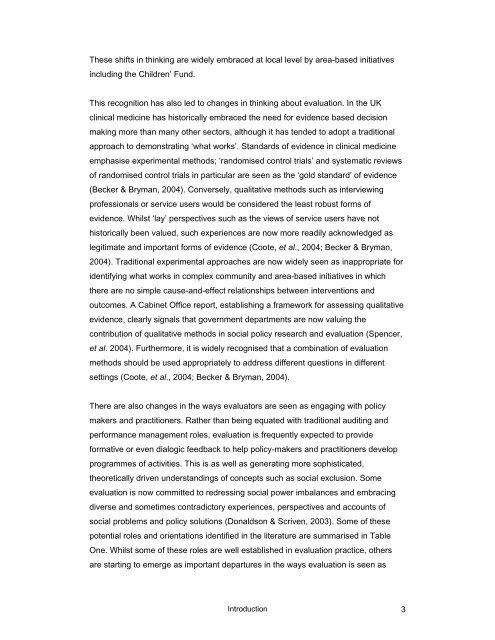Local Evaluation of Children's Services Learning from the Children's ...
Local Evaluation of Children's Services Learning from the Children's ...
Local Evaluation of Children's Services Learning from the Children's ...
- No tags were found...
Create successful ePaper yourself
Turn your PDF publications into a flip-book with our unique Google optimized e-Paper software.
These shifts in thinking are widely embraced at local level by area-based initiativesincluding <strong>the</strong> Children’ Fund.This recognition has also led to changes in thinking about evaluation. In <strong>the</strong> UKclinical medicine has historically embraced <strong>the</strong> need for evidence based decisionmaking more than many o<strong>the</strong>r sectors, although it has tended to adopt a traditionalapproach to demonstrating ‘what works’. Standards <strong>of</strong> evidence in clinical medicineemphasise experimental methods; ‘randomised control trials’ and systematic reviews<strong>of</strong> randomised control trials in particular are seen as <strong>the</strong> ‘gold standard’ <strong>of</strong> evidence(Becker & Bryman, 2004). Conversely, qualitative methods such as interviewingpr<strong>of</strong>essionals or service users would be considered <strong>the</strong> least robust forms <strong>of</strong>evidence. Whilst ‘lay’ perspectives such as <strong>the</strong> views <strong>of</strong> service users have nothistorically been valued, such experiences are now more readily acknowledged aslegitimate and important forms <strong>of</strong> evidence (Coote, et al., 2004; Becker & Bryman,2004). Traditional experimental approaches are now widely seen as inappropriate foridentifying what works in complex community and area-based initiatives in which<strong>the</strong>re are no simple cause-and-effect relationships between interventions andoutcomes. A Cabinet Office report, establishing a framework for assessing qualitativeevidence, clearly signals that government departments are now valuing <strong>the</strong>contribution <strong>of</strong> qualitative methods in social policy research and evaluation (Spencer,et al. 2004). Fur<strong>the</strong>rmore, it is widely recognised that a combination <strong>of</strong> evaluationmethods should be used appropriately to address different questions in differentsettings (Coote, et al., 2004; Becker & Bryman, 2004).There are also changes in <strong>the</strong> ways evaluators are seen as engaging with policymakers and practitioners. Ra<strong>the</strong>r than being equated with traditional auditing andperformance management roles, evaluation is frequently expected to provideformative or even dialogic feedback to help policy-makers and practitioners developprogrammes <strong>of</strong> activities. This is as well as generating more sophisticated,<strong>the</strong>oretically driven understandings <strong>of</strong> concepts such as social exclusion. Someevaluation is now committed to redressing social power imbalances and embracingdiverse and sometimes contradictory experiences, perspectives and accounts <strong>of</strong>social problems and policy solutions (Donaldson & Scriven, 2003). Some <strong>of</strong> <strong>the</strong>sepotential roles and orientations identified in <strong>the</strong> literature are summarised in TableOne. Whilst some <strong>of</strong> <strong>the</strong>se roles are well established in evaluation practice, o<strong>the</strong>rsare starting to emerge as important departures in <strong>the</strong> ways evaluation is seen asIntroduction 3
















